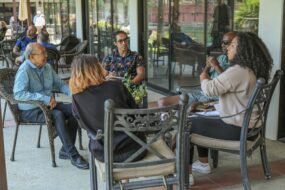March 25, 2017 • Life for Leaders
Hear, O Israel: The LORD is our God, the LORD alone. You shall love the LORD your God with all your heart, and with all your soul, and with all your might.
Deuteronomy 6:4 (NRSV)
I’ve always thought of myself as a good listener. It’s been an important value in my leadership work and there’s been some positive feedback along the way. But then, something catches me entirely off guard. Management issues surface, which I’ve let slip by unnoticed. Or, closer to home, during a conversation my wife says, “You haven’t been listening to a word I’ve said!” I hope that wasn’t literally true, but I take her point. Karl Barth once said that we are all beginners with God. I think the same can be said of listening. Every time is a new beginning.
It’s interesting to me that the command to listen begins today’s text on what has been called the Greatest Commandment. There is a sharp, prerequisite command-before-the-command, “Hear, O Israel”. I don’t think it’s just a rhetorical device to catch people’s attention. Jesus spends considerable energy in his teaching helping his listeners learn to listen well. Arguably, the Parable of the Sower, on which I’ve previously reflected, is a story about how to listen in a fruitful way to Jesus’ teaching. And, again interestingly, that Parable begins and ends with the same requisite command: “Listen! … Let anyone with ears to hear listen!” (Mark 4:3, 9 NRSV)
If the Parable of the Sower is about how to listen faithfully, today’s Scripture is the foundational text of what we are to hear. Mark Roberts has written a series of Life for Leaders devotionals on Jesus’ quotation of this text and how it might relate to our work as leaders. I want to add to Mark’s reflections from my own perspective.
To begin with, we are multidimensional beings. When we flatten that dimensionality – say, for example, in a photograph – something important is lost. We’ve all seen cardboard cutout pictures of people. No matter how realistic the picture, it’s easy to distinguish the real person from the façade. So it is with our discipleship.
Human beings are made to love God and neighbor in the full dimensionality of their being. In the language of today’s text, we are to love God with all our heart, with all our soul and with all our might. Another way to say that might be that we are to love God with a passionate heart, a keen mind, and a courageous will. These three dimensions – heart, mind and will – are hard to engage in an integrated way. It is easy to focus on one or even two of the dimensions and neglect the others.
Any one or two dimensions alone results in a distortion – a caricature – of our discipleship. A passionate heart and a courageous will without a keen mind easily become religious fanaticism. A keen mind and a courageous will without a passionate heart easily become manipulative orthodoxy. A keen mind and a passionate heart without a courageous will easily become impotent idealism.
Learning to hear in a way that fully engages our whole selves in all the dimensions of our being is the challenge of the Greatest Commandment. No part of who we are is exempt from the command to love God. And, no part of the world we inhabit is excluded from living out that love for God. On that subject, the text that follows in Deuteronomy has more to say. We will focus on that in the weeks to come.
QUESTIONS TO CONSIDER:
What do the words “heart”, “soul” and “might,” mean to you in today’s text? Why do you think that “mind” was added to the list in Jesus’ day? What does the repetition of the word “all” mean in the context of this command?
Of the three characteristics – a passionate heart, a keen mind and a courageous will – which comes more easily to you? Which is more difficult? Why do you think that might be?
How can you learn to listen to God and to others in a way that fully engages your whole self in all the dimensions of your being?
PRAYER:
Lord Jesus Christ, we are grateful for the capacity for us to hear and to respond. Thank you for your Spirit who guides us into all truth. And, thank you that your truth engages all aspects of who we are, not only our minds, but also our emotions and our physical bodies.
Help us to hear you and to respond in grateful obedience. May all that we are and all that we do become a living sacrifice to you. We ask this for your glory and for the good of the world that you love. Amen.
Explore more at the Theology of Work Project online commentary: The Ten Commandments (Deuteronomy 5:6-21)

During his adult life, Uli Chi has lived and worked in the intersection between business, the academy and the church. He has had the privilege of serving as past Board Chair of Regent College in Vancouver, BC, as current Vice Chair of the Board of the Max De Pree Leadership Center at Fuller Seminary, and as current Chair of the Executive Committee of the Center for Integrity in Business at Seattle Pacific University. He has also been involved in all aspects of local church leadership, including as a member of the adult ministries team’s teaching faculty at John Knox Presbyterian Church in Seattle.
Click here to view Uli’s profile.




